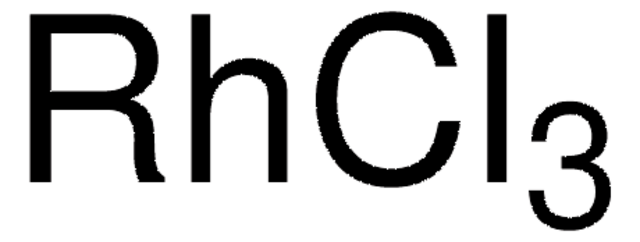Wichtige Dokumente
463779
Ruthenium(III)-chlorid Hydrat
99.98% trace metals basis
Synonym(e):
Trichlororuthenium hydrate, Ruthenium trichloride
About This Item
Empfohlene Produkte
Qualitätsniveau
Assay
99.98% trace metals basis
Form
powder and chunks
Eignung der Reaktion
reagent type: catalyst
core: ruthenium
Verunreinigungen
≤250.0 ppm Trace Metal Analysis
SMILES String
O.Cl[Ru](Cl)Cl
InChI
1S/3ClH.H2O.Ru/h3*1H;1H2;/q;;;;+3/p-3
InChIKey
BIXNGBXQRRXPLM-UHFFFAOYSA-K
Suchen Sie nach ähnlichen Produkten? Aufrufen Leitfaden zum Produktvergleich
Allgemeine Beschreibung
Anwendung
- As a precursor to prepare ultralow Ru loaded graphene aerogel that exhibits electrocatalytic performance in the hydrogen evolution reaction (HER), oxygen evolution reaction (OER), and oxygen reduction reaction (ORR).
- As a dopant to prepare Ru-doped TiO2 electron transport layer for mesoscopic perovskite solar cell by spin-coating technique. This helps to enhance photoconversion efficiency and air stability.
- To fabricate ultra-uniform Ru nanocluster catalyst via small-molecule self-assembly pyrolysis method. These catalysts exhibit excellent hydrogen evolution activity in Zinc air batteries under all pH conditions.
Sonstige Hinweise
Signalwort
Danger
H-Sätze
Gefahreneinstufungen
Acute Tox. 4 Oral - Aquatic Chronic 2 - Eye Dam. 1 - Skin Corr. 1B
Lagerklassenschlüssel
8A - Combustible corrosive hazardous materials
WGK
WGK 3
Flammpunkt (°F)
Not applicable
Flammpunkt (°C)
Not applicable
Persönliche Schutzausrüstung
Eyeshields, Faceshields, Gloves, type P3 (EN 143) respirator cartridges
Hier finden Sie alle aktuellen Versionen:
Besitzen Sie dieses Produkt bereits?
In der Dokumentenbibliothek finden Sie die Dokumentation zu den Produkten, die Sie kürzlich erworben haben.
Kunden haben sich ebenfalls angesehen
Artikel
Hydrogen is one of the most important resources in providing food, fuel, and chemical products for our everyday life. Sustainable catalytic hydrogen production from bioethanol has gained significant attention in recent years due to globally diminishing fossil fuel supplies, which have necessitated the search for new chemical feedstocks.
Unser Team von Wissenschaftlern verfügt über Erfahrung in allen Forschungsbereichen einschließlich Life Science, Materialwissenschaften, chemischer Synthese, Chromatographie, Analytik und vielen mehr..
Setzen Sie sich mit dem technischen Dienst in Verbindung.











